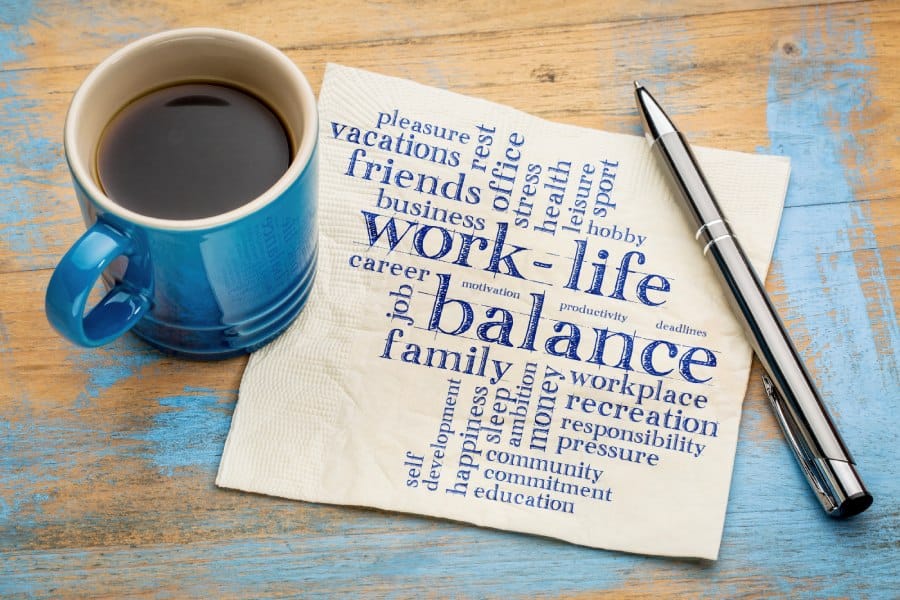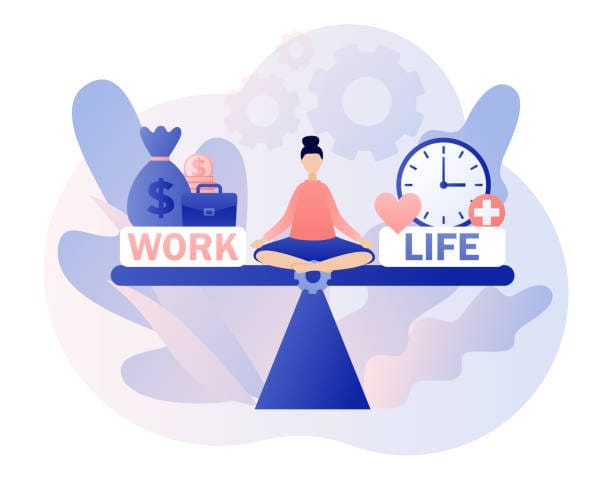7 Tips to Maintain a Good Work-Life Balance

We all have a life and then we have some work to do, to sustain our life, to give it some meaning and have a sense of fulfilment. But many times we struggle to maintain a balance and are torn apart by burnout, less productivity, time management issues and no growth. If we are looking for solutions, then there is no one sure shot formula or any secret potion which can help you achieve that balance. The right way is to form a correct set of habits, identifying our goals, setting boundaries and doing some meaningful work which aligns with our life goals.
If we think deeply, we speak about motivation at work, some external validation to do the same work better which we are already skilled at. There are competitions, awards, appraisals and a lot of freebies to keep you productive. But post work, we all are motivated. We are so much motivated and happy at the bowling alley, when the ball hits the pin, but what stops us from having that same sense of fulfilment when we are at work. I have tried to break down this complex issue, as per my observation and experience.
1. Happiness
A person achieves much more in all the fields of life, then an anxious and stressed individual.When we talk about happiness, I am neither talking about that somebody who has abundant money, but not sure what to do with their life, the neo rich ones. Nor am I talking about an individual who is deferring their life, in wait for some perfect moment when all will be right. Happiness is the state of mind, where you are living your life fully, with complete awareness. Happiness is not the end goal of any activity, it's the start point. If you are happy, you do the same mundane work in a better way. You look forward to doing your daily chores, walking to the office, doing your task with presence of mind and achieving your goals. You are not being forced to do anything beyond your will. Yes there will be days which will not be perfect but you should ensure that the place where you work does not make you unhappy.
Happiness is achieved , when you know your actionable responsibilities. and the reward you get on accomplishing it. Like when we hit the goal in the football ground, we are happy. We rejoice in the accomplishment of our goal. We know what is expected from us, has been fulfilled. Similarly, you should know what is expected from you at work, so that you know what has to be achieved to have that sense of accomplishment.
2. Goal setting
Goal setting is another important step towards living a balanced life. Your goals should be directly proportional to your personal aspirations. You may want a life where you can go cycling post work and not check your phone until the start of your next working day. Or you may be a person who drives happiness from cracking deals after deals, love to do research post work and spend time learning new skills in your free time. Goals setting will not be the same for both the person. One person may feel 20 hours of work in a week should be sufficient to keep you afloat and others take a long break only post strenuous long hours work week. Your goal setting should be dependent on the kind of life you want. Also a person wanting 20 hours work week, should not be discontent seeing accomplishment of a person working 70 hours a week.
Your goal settings are your individual and nothing to do with your peers. To start with, write your goals on a regular basis.
Read your goals, it may sound difficult but doable. If there is any goal, which you can accomplish within a few minutes or hours, do it first. Take a few minutes every now and then to evaluate your performance in respect to your goals. See if your routine, daily actions and behaviour is aligned to your goals.
While your goal setting and achieving that is your responsibility. There will be a moment when your manager will identify your loopholes. Those are the moments to stop and reflect. Maybe you need to course correct too. These goal settings if not done keeping your realistic capabilities in mind, if you bite more than you can chew, it will create imbalance in your life. So goal setting is a crucial aspect of your work life balance.
3. Appreciation
Appreciation is something we all look forward to. But appreciating is not just the duty of your manager or your employer or client. Appreciate yourself when you accomplish some good job. Reward yourself for some goal achievement. Secondly, if you want appreciation more often, ensure you make little mistakes in your work. Be mindful and alert while performing your duty. Acknowledge it with full heart and somebody appreciate you. do not take that as mundane work formality. Appreciating genuinely is an art, if you feel your manager should acknowledge your contribution, you can always be vocal about that. Of Course the amount of voice needed in this scenario depends on your own judgement of the situation. The best part of your job is, when you have complete independence to do your job. Where nobody reminds you, what has to be done next. When you take the ownership of your job, accomplish the task and identify the gaps where you need to improvise on. More than appreciation, your own understanding of the scenario which motivates you to do the intense focused work is your reward. If you complete your job in a better way and in less time than expected, you have achieved the balance.
4. Take feedbacks well
While working, you get appreciation as well as reprimanded. If you have a manager who lets you know both, you are a lucky one. You need to know that like appreciation, there are moments when you will be reprimanded when you do wrong. These are uncomfortable moments but a genuine reprimand is something which will help you in course correction. But for a healthy work life balance, you need to understand that reprimand is over when it's given. you should not carry it post work. You need to utilise it to correct your work and not be fearful that your whole body of work has gone for a toss due to one mistake. Reprimands does not mean you are no longer needed at your job. Every feedback, good or bad, is going to take you one step closer to your better self. I always say that clients who have given me the most rejections have taught me the most in my work. They have taught me newer ways to do the same job.
When anyone gives you negative feedback, it's like that blind spot while driving which you were not aware of and may cause some fatal accident. Be grateful to those who show you your mistakes. So to have a better work life balance, understand that feedback is an integral part of your job and taking that in your stride will only take you one step better.
5. Expanding your area of influence
Let's take an example, when a fresh graduate joins the job, they are leaving everything on the job for the first time. They need little too much appreciation but gradually their area of influence will increase. They will expand their wings and learn to do bigger tasks. They will face bigger challenges and achieve greater goals. But it will happen gradually. Once should try to focus and keep learning. More time multiplied with greater intensity results into greater goals. We all have read the quote, life begins at the end of your comfort zone. Slowly and steadily we should all push our limits else we stagnant our growth. We should strive to do one uncomfortable thing which may make you a better professional. It could be public speaking, self branding, taking up new skills or taking up a difficult client. That same thing, which looks difficult to you today, will become a cake walk tomorrow. So identify your areas of discomfort and do something exceptional. When you stop resisting the change, rather embrace it, you achieve an amazing sense of balance.
6. Have some downtime
Even for the most efficient workers, who manage time well. It becomes a challenge when to stop. So taking breaks is one such habit which will help you perform better in life. Taking a break does not mean you spend time on the phone. Taking breaks means going for a stroll, having some water and doing nothing. Spending time, even for 10-15 minutes rejuvenates you so well, that your focus will be automatically reset. Downtime can be boring as well. Even if it sounds absurd, reality is we have stopped getting bored. We are engaged in something or the other. Key to being productive is to be sometime in a stage of boredom. Doing nothing, feeling bored. Life has not to be happening, which sadly we have made up our life like that. We all have kept our brain engaged all the time. Either working, planning or the worst enemy is social media. Let's take one step nearer to our goals and try to reduce the screen time which is not benefiting us in any way. Rather we step out and meet a friend for coffee or just go nature walking.
7. Quit social media
Quitting social media is more difficult than quitting any other addictive habit. Social media is one such bane of the modern world, which has caused brain fatigue, reduced focus and increased anxiety in people. If you are using a social tool for networking, which can benefit you in some way, its still justified but mindless scrolling of social sites without any purpose can never be justified. And to top it up, these social sites are made addictive using all the know-how of psychology and algorithms. To have work life balance, we need to have a life post work not just a social media presence.
Mindfulness makes way for an organised life, deep and focussed work, achieving more in less time and better quality of life. Be aware of your distractions. A recent study has shown that your brain cannot differentiate work from the time you are mindlessly scrolling reels on social media. So learn when to unplug. Identify what gives you joy.
While I have tried to summarise the journey of work life balance, it can never be the same for two people. One has to identify their own limits, set their own goals and measure their own performance and happiness quotient. Let your trusted people know you need a break or any other kind of support from your employer. If your individual goals don't align with your employer's common goal, make a move. Ultimately it's your choice to make changes in your life to maintain a balance between work and life.
The ultimate aim is to have a happy fulfilling life, where your job supports you.
Read more:


